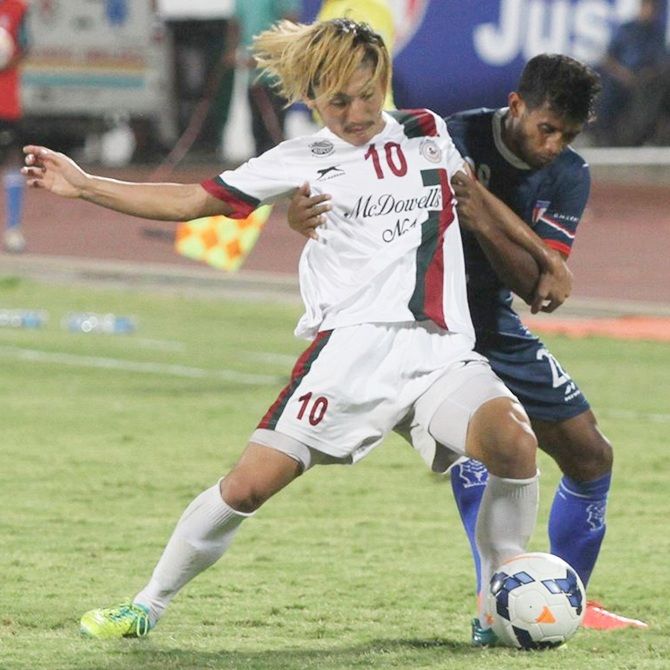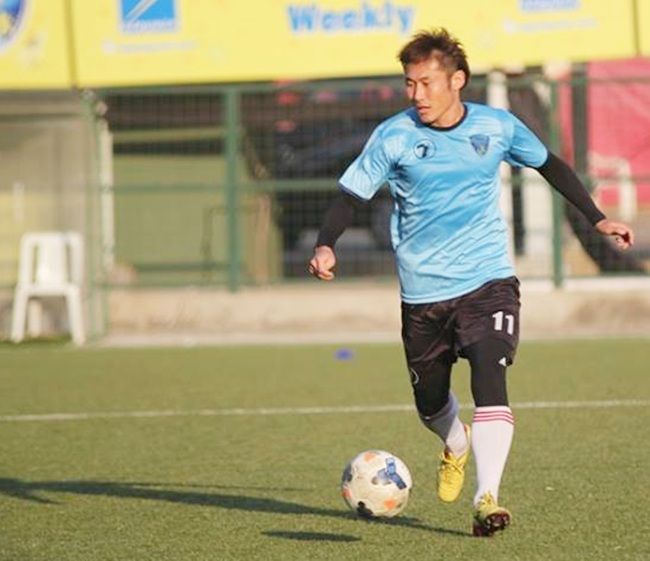‘I landed in India because I was desperate to play football’
‘I am here so that I can become a part of the changing phase of Indian football’
 When former Japanese J-League player Katsumi Yusa, currently plying his trade for Mohun Bagan, reached India, he could not sleep because of the noise around him. Now, after five years in the country, he just filters the din and manages a sound sleep.
When former Japanese J-League player Katsumi Yusa, currently plying his trade for Mohun Bagan, reached India, he could not sleep because of the noise around him. Now, after five years in the country, he just filters the din and manages a sound sleep.
When he drank water or ate food other than home-cooked, he had a stomach upset.
The 26-year-old, who has scored six goals for Bagan in the I-League thus far, also finds driving in India a crazy proposition and swears he will never ever attempt it.
Same is the case with Mumbai FC midfielder Taisuke Matsugae.
When he reached India he could not bear the honking; the lack of respect for traffic rules left him seething.
“Personally,” says the 32-year-old, “I find it selfish of people not giving way to the ambulance.”
Yet, these Japanese footballers have adapted to the Indian way of life, become an indispensable part of their respective I-League teams and made a mark for themselves.
The fact that All India Football Federation signed a historic Memorandum of Understanding with the Japan Football Federation only helps India’s cause. Like players from Nigeria and Brazil, the two Japanese players are making the right kind of noises in Indian football.
Laxmi Negi/Rediff.com caught up with the two footballers to find out more about their time in the country.
On coming to India...
Yusa: I had a three-year contract with a J-League club but in three years I played only for 50 minutes. I signed for a club Paraguay for which I was paid only $200. I paid for the flight tickets and spent my own money there. But the passing and dribbling football didn’t suit my style.
I landed in India because I was desperate to play football. My journey started with ONGC (he paid a crucial role in the club making it to the I-League in 2010, but after two years joined Mohun Bagan).
 Matsugae: I had played football only in Japan. But since I did not get to play in clubs in Japan, I tried to reach out to clubs in Thailand and Singapore. I landed in India because I was cheated by my agent. He lied to me about my salary and almost everything. But I have survived it all and am still here in India.
Matsugae: I had played football only in Japan. But since I did not get to play in clubs in Japan, I tried to reach out to clubs in Thailand and Singapore. I landed in India because I was cheated by my agent. He lied to me about my salary and almost everything. But I have survived it all and am still here in India.
Why India?
Yusa: When we look at the FIFA rankings, India cuts a very sorry figure. (India’s current FIFA ranking is 147). But 20 years ago Japan was in the same situation. There was no professional league. I am here so that I can become a part of the changing phase of Indian football.
Matsugae: I came to India because teams in Japan did not want me. Simple!
How has the country treated you?
Yusa: When I reached Mumbai, right from the traffic, the noise, the horns honking, it all frightened me. India is a difficult country. When I drank water I got loose motions and when I ate I got loose motion. I survived on spicy chicken curry and rice prepared by my Indian roommate. But it’s five years now and I have my own apartment in Kolkata and I cook and eat Japanese food.
Earlier It was difficult for me to sleep with the loud noises, but now I just block those noises. I am here not for the citizenship but only for money. I just concentrate on that and don’t bother about anything.
Matsugae: The culture, the people everything is different. But a Japanese player respects all these things. The only thing that gets to me is the manners of people. They like honking horns and do not follow lanes and traffic signals. So many times I see the ambulance is not given importance. I feel it is selfish of people by not letting the ambulance pass as it can be a matter of life and death of the person in that vehicle.
How have you changed in India?
Yusa: Japanese players are tactically very good; mentally, I have become a strong player.
In my first two years here in India it was difficult for me to deal with the heat. I used to save myself in the first half so that I could utilize that stamina in the second half, but that trick did not come handy. From my third season in India I started getting used to the heat. There were no short cuts, I realised that the only way out was to play full 90 minutes.
Matsugae: Japanese players are quite adaptive. I managed the heat and playing conditions quite well. We do not get into any confrontations and believe in only hard work.

Daily routine...
Yusa: I go for training, I come home, cook, then eat and go to gym and sleep. I follow this routine every single day. I do not get distracted from my aim of earning a lot of money soon and going back to Japan.
Before a match I think of celebrating a goal in different way, maybe a Japanese style of dance, but when I score I just forget about the celebrations. I just freeze. May be I am shy but I get the job done and do not worry about celebrations with flamboyance, like the Nigerians and Brazilians.
Matsugae: The strongest point of a Japanese player is that he can easily adjust. We are easy people and only Japanese can manage to do that.
What interest does Indian football generate in Japan?
Yusa: Sadly, no one is asking about I-League, but everyone is interested in the ISL (Indian Super League). They are amazed how super stars like Robert Pires and Alessandro Del Piero are playing in India.

Matsugae: There is a lot of interest about Indian football, but, sadly, the Japanese league starts in January whereas Indian season starts in August-September. And it is not in Japanese culture to go to any club mid-season. That is why there are few Japanese players in India.










 © 2025
© 2025